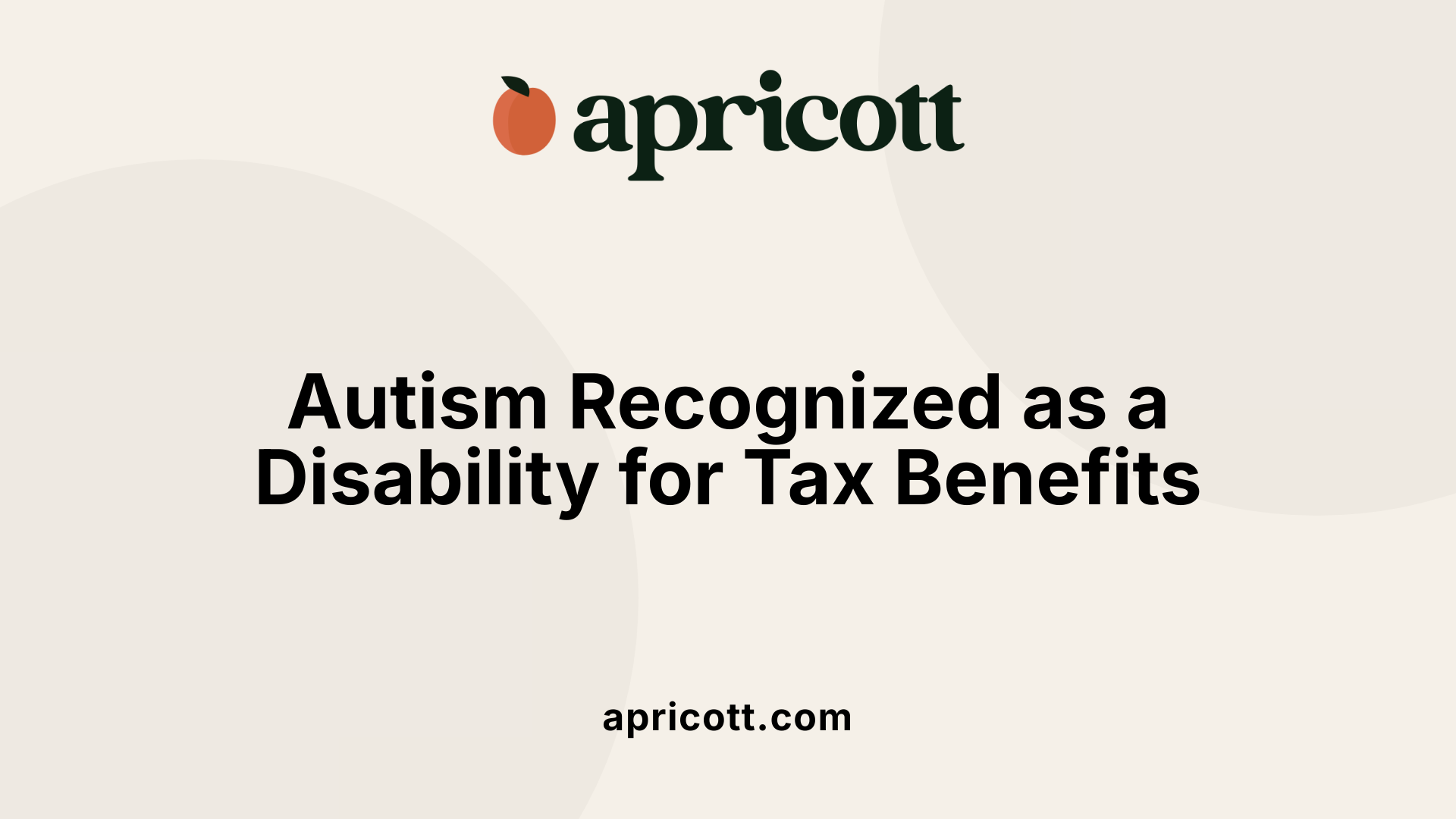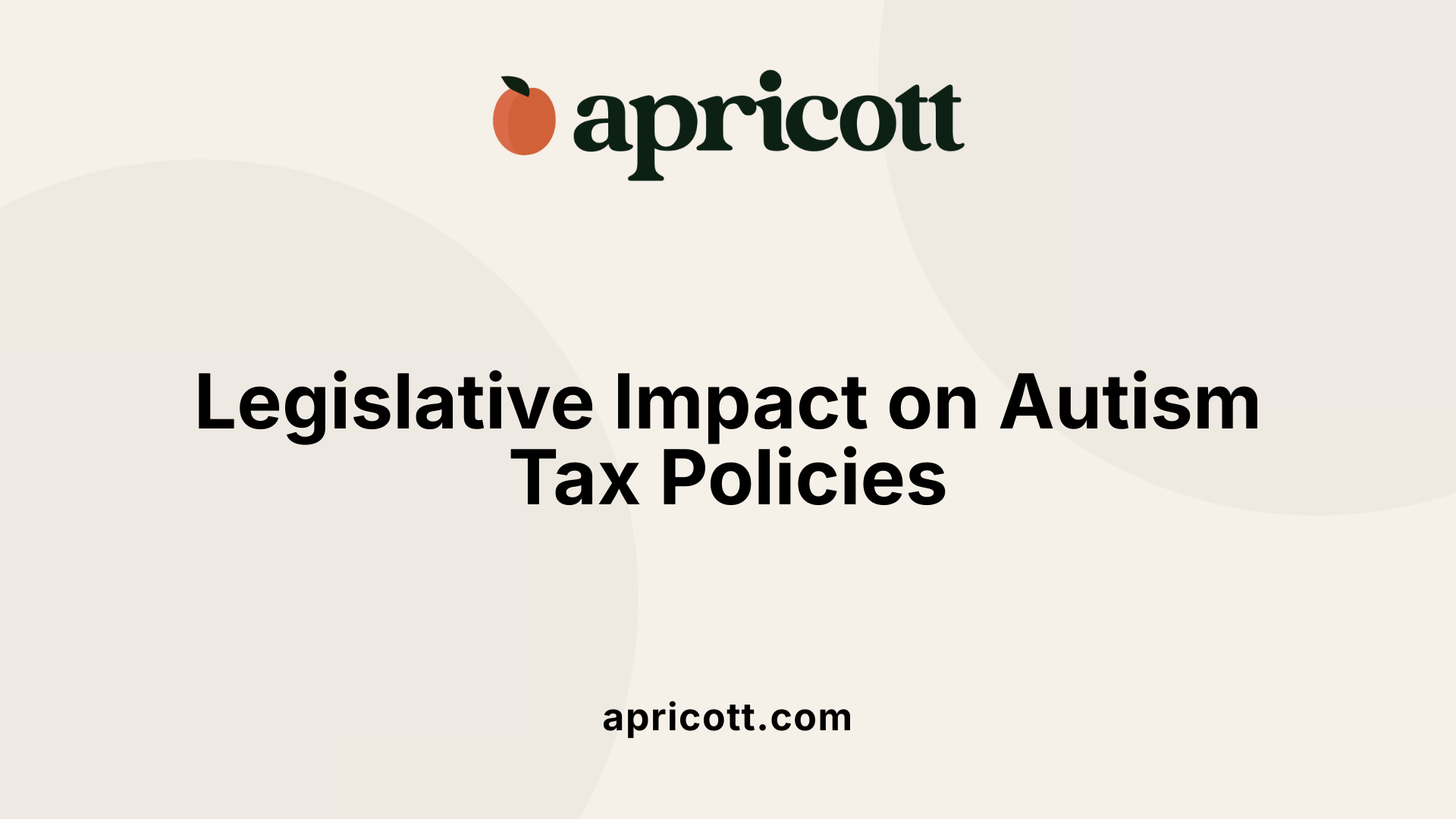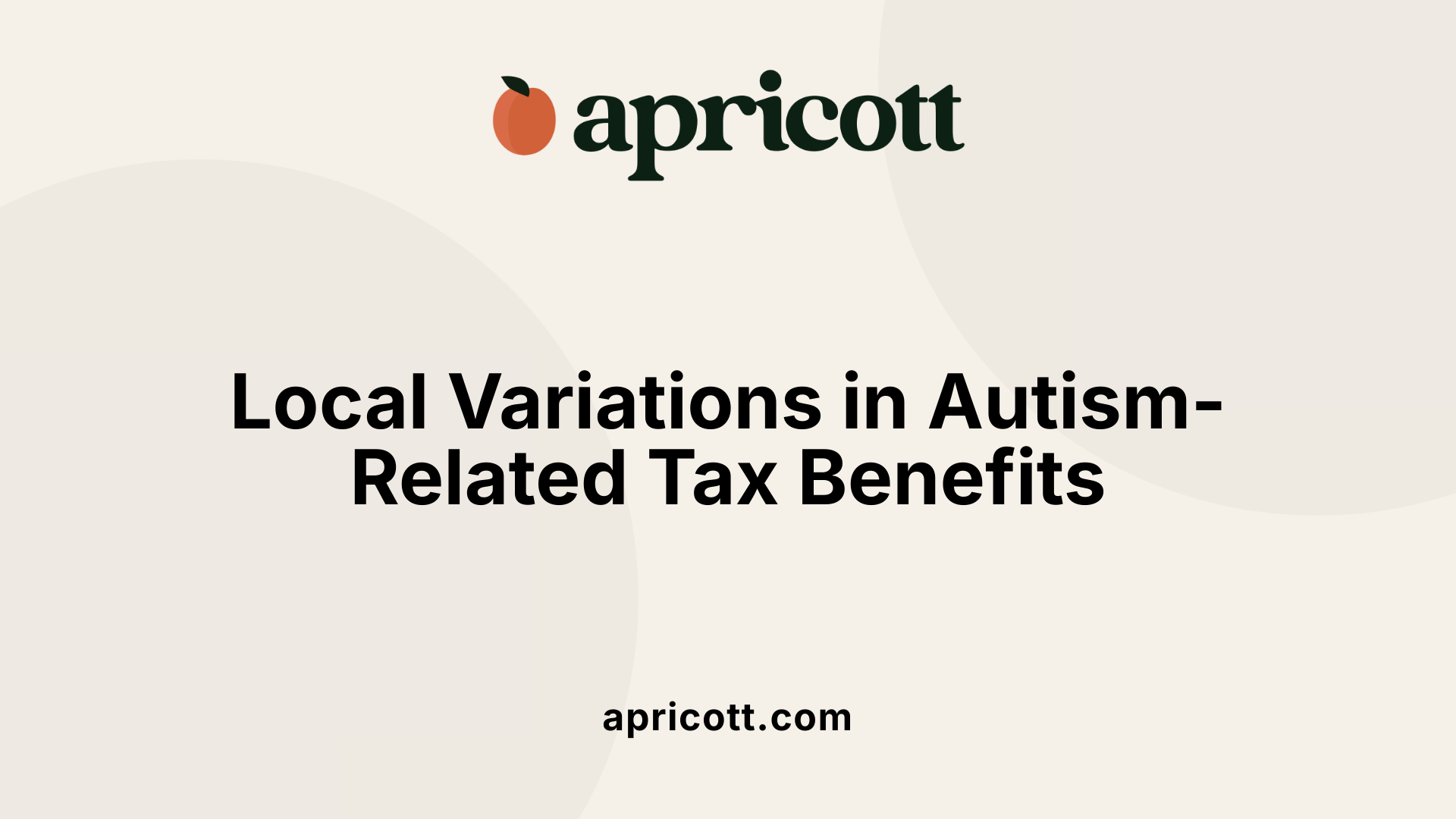September 2, 2025
Understanding the Tax Implications of Autism Funding in the U.S.
For families and individuals navigating autism across the spectrum, understanding how funding, grants, and benefits are treated by the tax system is crucial. This comprehensive guide explores whether autism funding is tax-exempt, how government benefits are taxed, and what deductions, credits, or exemptions may be available, helping families maximize financial support and plan effectively.

In the United States, autism is generally recognized as a disability that qualifies individuals for various tax benefits and protections. The IRS and other federal agencies consider autism a disability if it significantly limits major life activities, such as learning, mobility, or self-care.
Children diagnosed with autism are often viewed as "children with a disability" under applicable laws. This classification allows families to access a range of tax credits and early intervention services designed to support their needs.
Several tax benefits are available for families with children or dependents on the autism spectrum. For example, the Child Tax Credit can be claimed for children under 17 who meet residency and relationship criteria. Additionally, families may qualify for the Child and Dependent Care Credit if they pay for care that enables them to work or seek employment.
Specific programs differ by state. For instance, Oregon offers a tax credit for early intervention and special education services for children with disabilities, including autism. However, some state programs may have expiration dates or budget limits, such as Oregon’s program ending in 2028.
On a federal level, the IRS recognizes autism as a disability that can qualify an individual for the Disability Tax Credit, which provides additional benefits for those with severe and prolonged impairments. Families and individuals can also benefit from the tax-free growth of ABLE accounts—special savings accounts for persons with disabilities—that cover disability-related expenses like therapy, assistive technology, and home modifications.
Overall, autism's recognition as a disability under U.S. law allows families to claim various deductions, credits, and support programs. This not only provides financial relief but also enhances access to necessary services and accommodations.
While tax laws and available benefits can vary across jurisdictions, the general consensus is that autism is acknowledged as a disability for tax purposes in many contexts. Ongoing legislative efforts continue to aim at expanding these protections and ensuring that individuals with autism receive adequate support through the tax system.
| Benefit | Description | Eligibility Criteria |
|---|---|---|
| Earned Income Tax Credit (EITC) | Refundable credit for low-to-moderate income working families | Child must be considered permanently and totally disabled |
| Child Tax Credit | Credit up to $2,000 per qualifying child under 17 | Child claimed as dependent, U.S. citizen, and residing with taxpayer |
| Child and Dependent Care Credit | Credit for care expenses enabling employment | Expenses for a child with a disability, even over age 13, if IRS considers them "disabled" |
| ABLE Accounts | Tax-free savings for disability expenses | Onset before age 26, meets severity criteria |
| Disability Tax Credit | Credit recognizing severe impairments | Certification by a qualified medical professional |
Understanding how autism fits within the tax system can significantly impact financial planning and access to supportive resources. Consulting tax professionals or legal advisors familiar with disability law can help maximize available benefits.
Families with children diagnosed with autism may have access to various financial supports and benefits, which can have specific tax implications. Generally, the tax treatment of these supports depends on local tax laws, but many options are designed to provide financial relief through exemptions, deductions, or credits.
Medical expenses related to autism, such as diagnostic evaluations, therapy sessions (behavioral, speech, occupational, or physical), prescribed medications, specialized equipment, transportation, and home modifications, can often be deducted if they primarily aim to treat or alleviate autism-related conditions. To qualify, these expenses should exceed a certain percentage of the family’s Adjusted Gross Income (AGI)—typically 7.5%—and be well documented with receipts, reports, and insurance reimbursement records.
In addition to deductions, families might benefit from various tax credits. The Child and Dependent Care Credit allows parents to claim costs for caring for a disabled child, including those with autism, when the expenses are necessary for work or job searching. This credit can cover up to $3,000 for one dependent and $6,000 for multiple dependents.
The Disability Tax Credit is another valuable benefit. It offers a significant tax reduction for individuals with severe and prolonged disabilities, such as autism, that markedly limit daily functions. Certification by a qualified healthcare professional is needed to qualify.
Moreover, specialized savings accounts like ABLE (Achieving a Better Life Experience) accounts enable families to save funds for qualified disability expenses without affecting eligibility for benefits like Medicaid and Social Security. Contributions to ABLE accounts have annual limits—such as $17,000 for 2024—and the earnings grow tax-free if used for approved expenses.
State-specific benefits, like additional tax credits, property tax exemptions, or deductions for modifications, may exist. These vary widely by location and require families to check local regulations or seek advice from tax professionals for maximum benefit.
Overall, the combination of deductions, credits, and specialized savings plans helps reduce the financial burden of autism-related expenses and supports accessible healthcare, education, and living arrangements for affected individuals.
| Support Type | Description | Typical Benefits | Qualification Criteria |
|---|---|---|---|
| Medical Expenses Deduction | Expenses for therapy, equipment, home modifications | Possible deduction if over 7.5% of AGI | Must be primarily for autism treatment and documented |
| Child and Dependent Care Credit | Care expenses for children with disabilities | Up to $3,000 per child | Care necessary for employment or job search |
| Disability Tax Credit | Reduces tax liability for severely disabled individuals | Significant reduction in tax owed | Certified impairment by a healthcare provider |
| ABLE Accounts | Tax-free savings for disability expenses | Up to $17,000 contributions annually (2024) | Onset before age 26 with severe disability |
| State-specific Benefits | Vary by state, including exemptions and credits | Additional financial relief | Dependents must meet state criteria and eligibility |
Family members are encouraged to consult with a tax professional or local authorities to navigate these options effectively, ensuring they take full advantage of the available support systems.
Autism-related government benefits can have different tax implications depending on the specific program and the laws of the jurisdiction. Most essential supports like Supplemental Security Income (SSI), Medicaid, and certain government-funded therapies are generally considered tax-exempt. This means they are not counted as taxable income and do not need to be reported on federal tax returns.
However, not all benefits are automatically tax-exempt. Some educational subsidies, cash payments, or special grants might be taxable, so families should review local tax regulations carefully. For instance, some benefits such as stipends or certain transportation allowances could be taxable if they do not qualify as medical expenses or other exemptions.
Numerous tax deductions and credits can help offset the costs associated with autism. Medical expense deductions are available if they exceed 7.5% of the family’s Adjusted Gross Income (AGI), covering therapies, medications, specialized equipment, and related travel costs. Additionally, credits such as the Child and Dependent Care Credit provide relief for expenses incurred caring for a disabled child, including those with autism.
Special savings options like ABLE accounts allow for tax-free growth and distributions for qualified expenses, providing significant financial benefits for families. These accounts do not affect eligibility for Medicaid or Social Security benefits and can be funded up to limits set by the IRS.
To optimize the use of these benefits and deductions, consulting with tax professionals or local tax authorities is recommended. They can provide guidance tailored to individual circumstances and ensure families maximize available tax advantages.
For more detailed information, searching with queries like 'Taxability of government autism benefits' can offer further insights and updates on current laws and programs.

Yes, autism-related financial supports like ABLE accounts are designed to be tax-advantaged. Contributions made to ABLE (Achieving a Better Life Experience) accounts are not subject to federal income taxes. The earnings generated within these accounts grow tax-free, meaning that the investment gains or interest accrued do not get taxed as long as the funds are used for qualified disability expenses.
Distributions from ABLE accounts used for approved expenses—such as education, transportation, healthcare, housing, assistive technology, and employment support—are also exempt from federal taxes. This allows families and individuals to save for future needs without the burden of ongoing tax liabilities.
Additionally, having an ABLE account does not jeopardize eligibility for essential support programs like Medicaid and Supplemental Security Income (SSI). The first $100,000 in an ABLE account is excluded from resource limits for SSI, providing flexible financial planning avenues.
Overall, these accounts serve as a valuable financial tool, offering significant tax benefits to help support individuals with autism and other disabilities. They enable families to save for various needs securely while benefiting from tax exemptions on contributions, growth, and qualified withdrawals.
Beyond ABLE accounts, families might explore other ways to maximize financial benefits related to autism. Medical expenses such as therapy, medications, adaptive equipment, and home modifications may be deductible if they exceed certain thresholds of adjusted gross income. Some states also offer unique tax credits or exemptions for families with disabled children.
It's important to consult tax professionals and review specific state legislation to optimize these benefits. By leveraging these programs and deductions, families can better manage the financial challenges associated with autism, ensuring access to necessary services and supports.

Families caring for children with autism can access a range of tax advantages designed to offset the costs associated with diagnosis, treatment, and ongoing support. The U.S. tax system recognizes autism as a disability that may qualify individuals for specific credits, deductions, and exemptions.
One of the primary benefits includes deductions for medical expenses related to autism. These expenses, which must be primarily for treatment and alleviation of autism-related conditions, can include diagnostic evaluations, doctor visits, prescribed medications, behavioral therapy, speech, occupational, and physical therapies. If these expenses exceed 7.5% of the family's Adjusted Gross Income (AGI), they may be itemized as deductions on tax returns.
In addition to medical deductions, various tax credits are available. The Child Tax Credit, for children under 17 who qualify as dependents, provides up to $2,000 per child. The Earned Income Tax Credit (EITC) is a refundable benefit for lower-income families and can be claimed if the child with autism meets the IRS’s criteria for a qualifying child, including being considered permanently and totally disabled.
For families paying for childcare for children with disabilities, the Child and Dependent Care Credit can be claimed. This credit covers costs such as babysitting, daycare, or specialized care, helping offsets expenses up to $3,000 for one dependent or $6,000 for multiple dependents.
Furthermore, families can utilize ABLE accounts—special savings accounts designed for individuals with disabilities. These accounts allow tax-free savings and withdrawals for qualified expenses like education, housing, transportation, and healthcare, without impacting eligibility for federal programs such as Medicaid.
Legal expenses necessary to access appropriate services may also be deductible, along with costs for home modifications, specialized equipment, or service animals, especially if these are prescribed or recommended by healthcare professionals.
To maximize benefits, families should maintain meticulous documentation, including receipts, prescriptions, and medical reports. Consulting with a tax professional can help ensure correct claim submission, compliance with regulations, and full utilization of available benefits.
Many autism-related expenses are deductible as medical costs, including:
Some eligible expenses are capital in nature, such as home modifications to improve accessibility, which may qualify as medical expenses if recommended by a healthcare provider. Expenses for special schooling, tuition at specialized institutions, lodging, supervision, and transportation may also qualify if they pertain to medical treatment or training.
Understanding and claiming these benefits requires detailed documentation, including receipts, insurance reimbursements, and medical reports. Families are encouraged to keep thorough records of all related expenses and consult with tax or healthcare professionals to optimize their claims.
| Benefit or Deduction | Expense Type | Eligibility Details |
|---|---|---|
| Medical expense deductions | Therapy, evaluations, medications | Must be primarily for treating autism, exceed 7.5% of AGI |
| Child Tax Credit | Dependent children under 17 | Must be claimed as dependent, U.S. resident |
| Earned Income Tax Credit | Low-income families with disabled child | Must meet IRS disability and income criteria |
| Child and Dependent Care Credit | Childcare expenses | Necessary for work or job seeking, for dependents including those with autism |
| ABLE account contributions | Savings for qualified expenses | Tax-free growth for qualified disability costs |
| Home modifications | Structural changes | Medically necessary and recommended by professionals |
Tax benefits for autism-related expenses are a valuable resource for families, reducing financial burdens and supporting essential services. However, eligibility varies, and laws are subject to change. Families are advised to verify current regulations and seek expert guidance to maximize their benefits.

Yes, numerous laws and policies at both federal and state levels influence how autism-related expenses and funding are taxed in the United States.
At the federal level, the IRS provides guidelines that permit families to deduct medical expenses related to autism, such as diagnostic evaluations, therapy, medications, specialized equipment, and home modifications, if these costs primarily aim to treat and alleviate autism symptoms. These deductions are subject to thresholds, such as exceeding 7.5% of the family’s Adjusted Gross Income (AGI). Additionally, families can claim various tax credits like the Child Tax Credit, Child and Dependent Care Credit, and the Earned Income Tax Credit (EITC), which can reduce tax liability or provide refunds.
A notable federal policy is the Autism Savings Accounts enacted through the ABLE (Achieving a Better Life Experience) Act. These tax-advantaged accounts allow individuals with disabilities, including autism, to save money for qualified expenses such as healthcare, education, and employment support. Contributions to ABLE accounts are tax-free, and withdrawals used for approved expenses are also tax-free, helping families optimize financial resources without jeopardizing benefit eligibility.
State-specific policies may include property tax exemptions, credits, and programs designed for families with disabled children. For instance, some states offer tax checkoff programs, where taxpayers can make voluntary contributions to autism research and services, such as North Carolina's law allowing a special credit for families transferring children from public to private or home schooling.
Furthermore, certain states have enacted tax exemptions or deductions for expenses related to home modifications or educational services for children with disabilities. These can include exemptions from sales tax for assistive devices or property tax reductions for homes adapted for special needs.
In addition to individual support, some policies incentivize businesses to accommodate employees with disabilities through tax credits, like the Disabled Access Credit and Architectural Barrier Removal Tax Deduction, encouraging greater inclusion.
In summary, legislation on autism and taxation encompasses a broad spectrum—from deducting medical expenses and claiming credits at the federal level to state-specific exemptions and voluntary taxpayer contributions. Families and caregivers are advised to consult qualified tax professionals to navigate these options effectively and maximize available benefits.
| Policy Type | Details | Example |
|---|---|---|
| Medical Expense Deductions | Deduct costs like therapy, evaluations, equipment, and home modifications | IRS guidelines, thresholds |
| Tax Credits | Child Tax Credit, Child and Dependent Care Credit, EITC, adopted children with disabilities | Refundable and non-refundable |
| ABLE Savings Accounts | Tax-free savings for qualified expenses for disabled individuals | Contribution limits, tax-free growth |
| State Tax Exemptions and Credits | Property and sales tax exemptions, voluntary contributions for research and services | North Carolina tax checkoff, property exemptions |
| Business Incentives | Credits for businesses providing accessible services and adapting facilities | Disabled Access Credit, Barrier Removal Deductions |
This evolving landscape underscores the importance for families to stay informed of current laws and consult professionals when planning for autism-related financial and tax matters.
 When exploring tax advantages and benefits related to autism, it is important to recognize that these can vary significantly by state and locality. Many states offer specific tax credits, property tax exemptions, or sales tax reductions for families with children who have disabilities, including autism. For example, some states provide additional property tax exemptions for disabled dependents, which can ease the financial burden for families.
When exploring tax advantages and benefits related to autism, it is important to recognize that these can vary significantly by state and locality. Many states offer specific tax credits, property tax exemptions, or sales tax reductions for families with children who have disabilities, including autism. For example, some states provide additional property tax exemptions for disabled dependents, which can ease the financial burden for families.
Furthermore, legislation such as North Carolina’s House Bill 344 illustrates how states may implement unique benefits like tuition credits for families choosing private or home schooling for children with disabilities.
Given these variations, consulting local resources and professionals familiar with state-specific laws is crucial. Tax professionals or local disability advocacy groups can offer guidance on available benefits, eligibility criteria, and how to apply for them effectively. This ensures families do not miss out on any potential savings or support that could improve the quality of care and education for children with autism.
In summary, understanding regional rules and working with knowledgeable advisors can maximize the benefits available, helping families navigate the complex landscape of autism-related tax incentives and support programs.
Understanding the tax implications of autism funding and related expenses is essential for families seeking financial relief and planning for the future. Many autism-related benefits, such as government aid and accounts like ABLE, are designed to be tax-advantaged or tax-exempt to help offset costs. However, tax laws and benefits can differ by state and individual circumstances, making it crucial to consult with tax professionals who are well-versed in disability-related tax law. By staying informed and organized, families can leverage available credits, deductions, and programs to enhance their financial stability and access vital services, ensuring that individuals on the autism spectrum receive the support they need without unnecessary tax burdens.